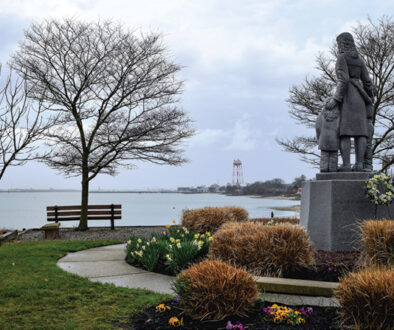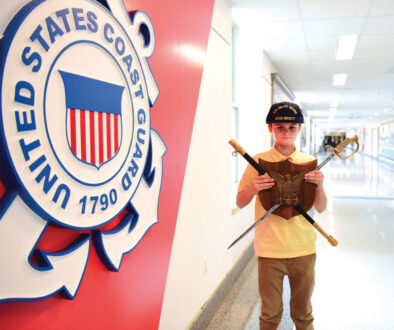Leadership During Crisis: A Conversation with Thad W. Allen
He has been named “The Master of Disaster” and “Katrina’s Point Man.” U.S. News & World Report lists him among the top 20 leaders of 2005. In 2011, he was featured by the Council on Foreign Relations in its HBO series History Makers, which focuses on some of the most important contributions by prominent individuals at critical junctures in U.S. foreign policy.

Official U.S.C.G. portrait
Admiral Thad W. Allen, U.S. Coast Guard (retired), Coast Guard Commandant from May 2006-May 2010, is universally praised for his superior leadership skills and for leading complicated response and recovery efforts to difficult crises in the nation’s recent history.
After 9/11, he led the Coast Guard in securing the ports along the Atlantic seaboard. After Hurricanes Katrina and Rita, he was the principal federal response official in the Gulf Coast region. In 2010, he was selected by President Obama as national incident commander for the response to the Deepwater Horizon oil spill in the Gulf of Mexico. In that post, he worked closely with federal, state and local agencies, and BP, bringing unity to an unprecedented response effort.
His distinguished Coast Guard career began when he graduated from the United States Coast Guard Academy in 1971. Among his many honors and awards, he was the first recipient of the Homeland Security Distinguished Service Medal, and was awarded three Coast Guard Distinguished Service medals and the Legion of Merit.
All this might have come about in part because he and other seniors were benched by his football coach during his final year of high school.
“I ultimately chose the Coast Guard Academy for a completely irrelevant reason,” he joked with audience members in an HBO History Makers episode. “My high school football coach benched all the seniors halfway through the year because we were losing—it made me mad. So I decided to go someplace where I’d have a chance to play college football. I picked the Coast Guard Academy because it was a Division III school,” he laughed. “And I walked on the football team as a freshman, and I was a defensive captain my senior year. And yes, I was the middle linebacker. And I hung around and became the commandant. If I write an autobiography, it would be Accidental Admiral.”

How do you, personally, recognize a good leader?
By the way they treat people and how they are perceived by subordinates and peers, together with intelligence, critical thinking, and emotional intelligence.
How does a leader test him/herself in the midst of crisis? Or, how do you know you are on the right path when making a tough call?
Be totally honest and transparent and focus on the problem or problems to be solved without regard to politics or parochial interest. You need to understand politics and manage it, but not be guided or driven by it.
Why is the “unity” part in managing a difficult crisis so important? What can make it so challenging?
No single entity or person can solve a complex challenge by themselves. Solutions to complex situations require outcomes be co-produced by a diverse set of capabilities and competencies. Deepwater Horizon required a private sector solution but under government supervision to insure the public interest was protected.
Are there figures from either fiction or history you identify with, or whom you admire for their leadership styles?
Several, but not one monolithic persona. I draw inspiration and model the behaviors of a wide cast of characters who are very diverse.
From history, Alexander Hamilton: greatest U.S. citizen who was never President. Abraham Lincoln: He created unity at the most critical time in the nation’s history with a band of rivals. Anwar Sadat: He had the courage to sign a peace treaty with Israel and was assassinated by the extremist that ultimately helped form Al Qaeda. George Marshall: He created modern Europe and set conditions for the Soviet defeat in the Cold War. Douglas Munro: He was the only Coast Guard Medal of Honor winner. The members of the Great Overland Expedition to save stranded fishermen off the north slope of Alaska. Oskar Schindler and Bernie Webber [on whom the movies Schindler’s List and The Finest Hours are based, respectively].
From fiction: Antigone, The Secret Sharer (Joseph Conrad), Tom Hanks’ character in Saving Private Ryan, Robin Williams’ character in Dead Poets Society, Anthony Hopkins’ character in The World’s Fastest Indian.
Can you imagine a day when human beings are so self-regulating that they no longer need outstanding leaders?
No.
Can you give an example of a complicated or conflicting legal landscape during any of your leadership roles in response to crises, and how you worked through it?
The Constitution states that all powers not granted to the federal government are reserved to the states, notably natural disaster response. In those situations the federal government role is to assist and provide resources, not preempt local governments. In Katrina, the federal government had no legal authority to preempt the mayor or governor. We had to work with the local leaders. In the Deepwater Horizon spill, the event was outside state waters and there was federal supremacy for the response. In that situation, we had to deal with five states and local political leaders who wanted control.
What do ordinary citizens need to better understand during a crisis?
If individuals understand their personal responsibility to be prepared (medicine, food for 72 hours) several good things happen. First, they don’t put demand on emergency services; they are as self-sufficient as they can be. Second, resources can be provided where they are needed most. Third, you are capable of helping your neighbor and complying with direction from leaders. This creates a virtuous cycle of resiliency in a neighborhood and community.
What was one of your greatest challenges as the leader in command of the Hurricane Katrina response efforts?
We failed to recognize for a week that the City of New Orleans had lost continuity of government and couldn’t manage the resources being provided to them.

What was the most challenging aspect as national incident commander of the BP Oil Spill?
Dealing with political leaders who didn’t feel relevant in solving the problem because the expertise lay in the private sector and the responsible party had to be held accountable to fix the problem. There was little trust and great suspicion and cynicism regarding BP’s intentions.
You oversaw all Coast Guard operations on the U.S. East Coast, Gulf Coast and Great Lakes after the September 11 terrorist attacks, securing the nation’s coastlines. What national resiliencies were tested during this time? What lessons do we still have to learn, and what do we still have to prepare for regarding terrorist threats?
We now know in a free society we cannot live risk free without compromising some of our rights to protect the population at large. We must always seek to assimilate diverse populations but be vigilant regarding behavior that puts us at risk. As our founding fathers said, eternal vigilance is the price of liberty, but that vigilance shouldn’t dehumanize us and drive us from the values the country was built on.
You testified in March before Congress on the necessity of increasing safeguards to the U.S. Global Positioning System. Why this is so important for national security?
GPS and other global navigation satellite system (GNSS) are ubiquitous in our lives. They provide three things: position (where am I), navigation (where am I going), and time. All of our financial, electrical generating, cell phone, and new transportation systems rely on GPS-supplied timing. Its security is as critical as cyber security, and they are interconnected.
Could you comment on the idea of global warming as a matter of national security?
When I was asked my opinion at a hearing years ago I told a congressman, “I am agnostic to the science. There is water where there didn’t use to be, and I am responsible for it.” Climate refugees will dwarf any diaspora in history.
What advice would you give to young people considering a career in the Coast Guard?
The Coast Guard combines the discipline and rigor of a military service with law enforcement authority and humanitarian missions. It is a unique product of the American Revolution and the genius of Alexander Hamilton.



